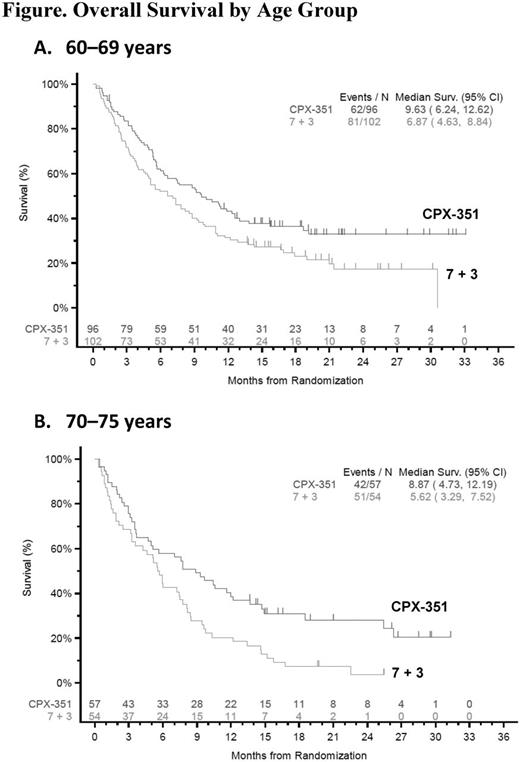Abstract

Introduction
CPX-351 (Vyxeos), a liposomal formulation of cytarabine and daunorubicin encapsulated at a 5:1 molar ratio, has shown enhanced efficacy compared with standard induction in older adults with high-risk AML in phase II clinical trials. Presented here are pre-specified secondary subgroup results from a phase III randomized, open-label study of CPX-351 versus 7+3 (cytarabine plus daunorubicin) in newly diagnosed patients with high-risk features, focusing on efficacy results stratified by age group.
Methods
Eligible patients were aged 60 to 75 years and had secondary AML, either therapy-related or an antecedent myelodysplastic syndrome (MDS), chronic myelomonocytic leukemia, or AML with World Health Organization-defined MDS-related cytogenetic abnormalities. Patients were randomized 1:1 to receive CPX-351 induction (100 units/m2 [100 mg/m2 cytarabine + 44 mg daunorubicin mg/m2] on days 1, 3, and 5 [first induction only]) or 7+3 induction (cytarabine 100 mg/m2/day x 7 days plus daunorubicin 60 mg/m2 on days 1, 2, and 3 [first induction] or x 5 days [reinduction/consolidation] plus daunorubicin 60 mg/m2 on days 1 and 2). A dynamic allocation procedure was performed to stratify patients by age group (60-69 or 70-75 years) for each arm of the study. The distribution of overall survival (OS) by treatment arm was estimated using the method of Kaplan-Meier. Efficacy for each age group was reported in terms of median OS in months and percentage of patients with a morphologic complete remission (CR) or CR with incomplete platelet or neutrophil recovery (CRi) according to International Working Group criteria.
Results
Three hundred and nine patients were enrolled from December 2012 to November 2014 at 39 US and Canadian sites, with 153 patients randomized to the CPX-351 arm and 156 to the 7+3 arm. Among patients aged 60-69 years, there were 96 patients in the CPX-351 arm and 102 in the 7+3 arm; for patients aged 70-75 years, there were 57 and 54 patients in each arm, respectively. Demographic data for these age subgroups were similar between the CPX-351 and 7+3 arms of the study.
The CR+CRi rates for patients aged 60-69 years were 50.0% for patients in the CPX-351 arm and 36.3% in the 7+3 arm, with an odds ratio (OR) of 1.76 (95% confidence interval [CI], 1.00-3.10); for patients aged 70-75 years, the rates of CR+CRi were 43.9% and 27.8%, respectively, with an OR of 2.03 (95% CI, 0.92-4.49). Kaplan-Meier curves for OS by age group are shown in the Figure. Median OS in months for patients aged 60-69 years was 9.63 in the CPX-351 arm and 6.87 in the 7+3 arm, with a hazard ratio of 0.68 (95% CI, 0.49-0.95); for patients aged 70-75 years these were 8.87 for the CPX-351 arm and 5.62 for the 7+3 arm, with a hazard ratio of 0.55 (95% CI, 0.36-0.84). The allogeneic hematopoietic cell transplant (HCT) rate in patients aged 60-69 years was 37.5% in the CPX-351 arm and 32.4% in the 7+3 arm, with an OR of 1.25 (95% CI, 0.70-2.25). For patients aged 70-75 years, the allogeneic HCT rates were 28.1% and 11.1%, respectively, with an OR of 3.12 (95% CI, 1.12-8.72). Incidence of grade 3-5 adverse events were virtually equal (92% vs 91%) and were similar in frequency and severity in both arms. The most common grade 3-5 nonhematologic adverse events (>10% overall) were febrile neutropenia (CPX-351: 68%; 7+3: 71%), pneumonia (CPX-351: 20%; 7+3: 15%), and hypoxia (CPX-351: 13%; 7+3: 15%).
Conclusions
This subgroup analysis of patients aged 60-69 and 70-75 years with untreated secondary AML demonstrated that CPX-351 treatment had substantially greater median OS and higher CR+CRi rates than standard 7+3 (cytarabine and daunorubicin) in both age groups. In addition, somewhat more patients in each age group in the CPX-351 arm received allogeneic HCT compared with the 7+3 arm, with the greatest difference in the older age group. Future studies with larger patient groups are warranted.
Support: Celator Pharmaceuticals, Inc., a subsidiary of Jazz Pharmaceuticals plc.
Medeiros:Agios: Consultancy, Research Funding; Amgen: Consultancy; ARIAD: Consultancy; Celgene: Consultancy, Other: Travel, Accomodations, Expenses, Research Funding; Novartis: Consultancy, Research Funding; Pfizer: Consultancy; Roche/Genentech: Consultancy, Research Funding; Celator: Other: Travel, Accomodations, Expenses, Research Funding; MEI Pharma: Research Funding; Merck/Schering Plough: Research Funding. Lancet:Celgene: Consultancy, Research Funding; Quantum First: Consultancy; Kalo Bios: Consultancy; Pfizer: Research Funding; Novartis: Consultancy; Jazz Pharmaceuticals: Consultancy; ERYtech: Consultancy; Biopath Holdings: Consultancy; Karyopharm: Consultancy; Boehringer-Ingelheim: Consultancy; Seattle Genetics: Consultancy; Baxalta: Consultancy; Amgen: Consultancy. Cortes:ARIAD: Consultancy, Research Funding; Bristol-Myers Squib: Consultancy, Research Funding; Novartis: Consultancy, Research Funding; Pfizer: Consultancy, Research Funding; Teva: Research Funding. Ritchie:Celgene: Consultancy, Other: Travel, Accomodations, Expenses, Speakers Bureau; Incyte: Consultancy, Speakers Bureau; Novartis: Consultancy, Other: Travel, Accommodations, Expenses, Research Funding, Speakers Bureau; Ariad: Speakers Bureau; Pfizer: Consultancy, Research Funding; Astellas Pharma: Research Funding; Bristol-Meyers Squibb: Research Funding; NS Pharma: Research Funding. Stuart:Astellas: Research Funding; Incyte: Research Funding; Agios: Research Funding; Sunesis: Consultancy, Honoraria, Other: Travel, Accomodations, Expenses, Research Funding; Bayer: Research Funding; Celator: Research Funding. Strickland:Sunesis Pharmaceuticals: Consultancy, Research Funding; Boehringer Ingelheim: Consultancy, Research Funding; Celator: Research Funding; Astellas Pharma: Research Funding; Alexion Pharmaceuticals: Consultancy; Sanofi: Research Funding; CTI Biopharma: Consultancy; Karyopharm Therapeutica: Research Funding; Baxalta: Consultancy; Daiichi Sankyo: Consultancy; Ambit: Consultancy; Abbvie: Research Funding; Cyclacel: Research Funding; GlaxoSmithKline: Research Funding. Hogge:Sanofi: Consultancy; Roche: Other: Travel, Accomodations, Expenses. Stone:ONO: Consultancy; Xenetic Biosciences: Consultancy; Seattle Genetics: Consultancy; Amgen: Consultancy; Agios: Consultancy; Karyopharm: Consultancy; Abbvie: Consultancy, Membership on an entity's Board of Directors or advisory committees; Celgene: Consultancy, Membership on an entity's Board of Directors or advisory committees; Novartis: Consultancy; Juno Therapeutics: Consultancy; Celator: Consultancy; Roche: Consultancy; Sunesis Pharmaceuticals: Consultancy; Merck: Consultancy; Pfizer: Consultancy; Jansen: Consultancy. Kolitz:Gliead Sciences: Consultancy; Seattle Genetics: Consultancy; Pharmacyclics: Consultancy. Schiller:Celator: Research Funding. Ryan:AbbVie: Equity Ownership; U of Rochester: Patents & Royalties. Chiarella:Celator Pharmaceuticals, Inc., a subsidiary of Jazz Pharmaceuticals plc.: Employment, Equity Ownership. Louie:Celator Pharmaceuticals, Inc., a subsidiary of Jazz Pharmaceuticals plc.: Employment, Equity Ownership. Uy:Glycomimetics: Consultancy; Boehringer Ingelheim: Consultancy.
Author notes
Asterisk with author names denotes non-ASH members.

This icon denotes a clinically relevant abstract


This feature is available to Subscribers Only
Sign In or Create an Account Close Modal